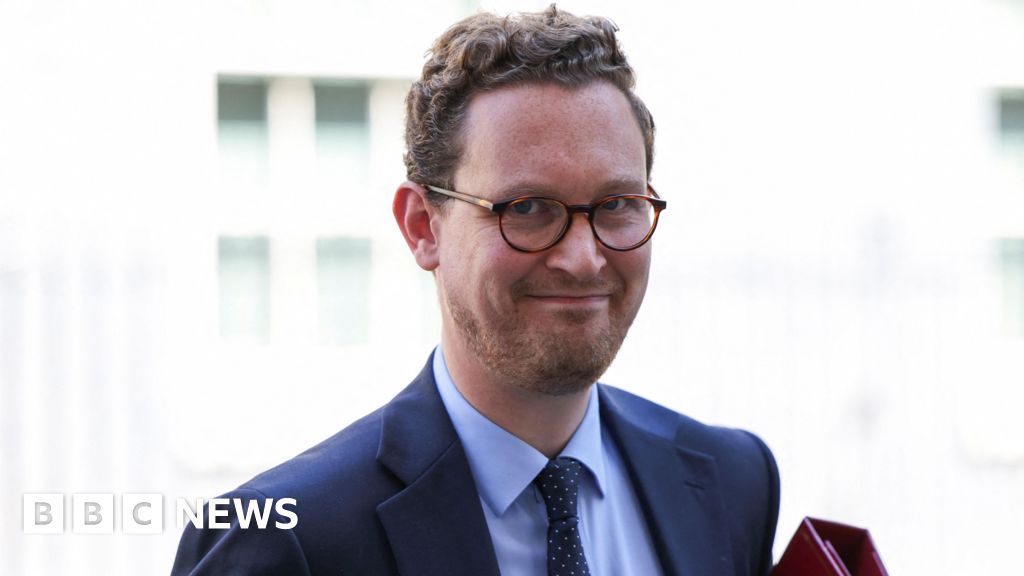All rules have been followed in the appointment of a Labour Party donor to a senior Treasury role, a government minister has insisted.
Chief Secretary to the Treasury Darren Jones told BBC Radio 4’s World At One programme that appointing Ian Corfield as director of investment at the Treasury was “perfectly appropriate” and “it’s good to bring in external expertise”.
The Conservatives have called it “hypocrisy off the scale” from Labour.
They have also pointed to the appointment of Jess Sargeant, who previously worked for think tank Labour Together, to a senior role in the Cabinet Office as further evidence the government is undermining civil service impartiality.
Ms Sargeant has been made a deputy director in the Cabinet Office’s Propriety and Constitution Group (PCG).
Tory shadow Cabinet Office minister John Glen accused the government of “an abuse of taxpayers’ money” and putting “the fundamental and enduring impartiality of our civil service” at risk.
In opposition, Labour often accused the Conservatives of “cronyism” in appointing political allies to public bodies.
Mr Corfield, a former banker who has donated a total of £20,000 to Labour MPs including £5,000 to now-Chancellor Rachel Reeves in 2023, was brought in to help deliver an international investment summit in October.
He is understood to be on a fixed-term contract for what a source described as a “very limited” period of time.
Asked whether it was acceptable to give civil service posts to Labour donors, Mr Jones told the BBC appointments were “always made based on skillsets and need, and in line with the rules, and that’s how this has worked in this particular set of circumstances”.
He added: “There’s no suggestion that any rules have been broken because they haven’t.”
It was “understandable” the Conservatives wanted to make a “political issue of it”, but it was “perfectly appropriate within the rules to appoint people, for example in Mr Corfield’s circumstances, for a fixed period of time to deliver a fixed outcome, by bringing in the skills that were needed and were not currently available in the Treasury”, he said.
Asked if he was happy with how the situation looked, Mr Jones said: “Even from an optics perspective, I am comfortable with it because all of the rules have been followed.
“It’s good to bring in external expertise into the civil service to deliver on our priorities and it’s good to bring in that challenge, that different set of experience, especially from the private sector.”
There are no rules automatically preventing someone being appointed to a civil service role because of a political donation, but candidates are told they must understand the requirement to act impartially if appointed.
Ms Sargeant previously focused on constitutional issues when she worked for Labour Together, a think tank close to Sir Keir Starmer, and at the Institute for Government (IfG) think tank.
According to the Cabinet Office, the PCG is responsible for “ensuring the highest standards of propriety and ethics across all government departments”, as well as “overseeing constitutional policy and providing advice to ministers”.
The Cabinet Office said her role would not involve propriety casework or investigations. Instead, it was to provide policy expertise, particularly on constitutional reform.
As well as Mr Corfield, the government has faced questions about another individual linked to previous donations to the Labour Party being appointed to a senior civil service role.
Emily Middleton was named a director general in the Department for Science, Innovation and Technology (DSIT), where the secretary of state is Peter Kyle.
She was previously a partner at consultancy firm Public Digital, which paid for her secondment to Mr Kyle’s office in opposition – a donation in kind of more than £65,000. She was also seconded to Labour Together.
A government spokesperson said Ms Middleton’s appointment was made “in line with the civil service rules on recruitment”.
It is understood that Mr Corfield, Ms Middleton and Ms Sargeant were all appointed under an exceptional recruitment route that can be used to hire officials in some circumstances, such as when they have “highly specialist” skills or are being hired for short-term roles.
So-called “exceptions” to the normal rules have been granted more than 100 times in the past year.
IfG director Hannah White said this route had a “valuable” role to play in bringing “talent and experience” into government.
But in a blog post, she added “some of these exceptional appointments” could have been as political advisers rather than civil servants.
She said “none of the appointments” seemed urgent enough to justify not running a “rapid recruitment process” for the jobs.

